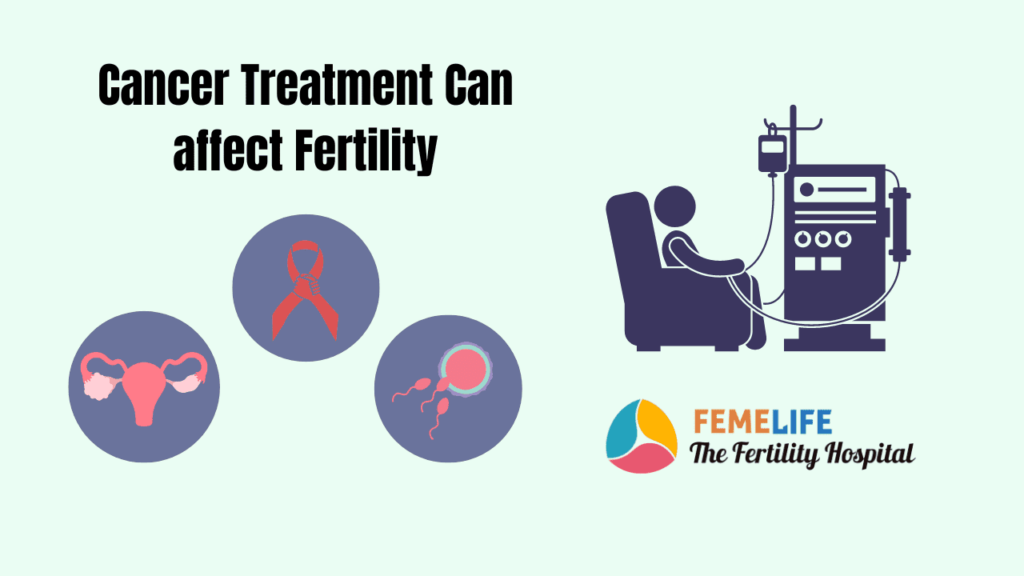The term “fertility” describes the capacity to conceive or have children. The ability to become pregnant through regular sexual activity and be able to bring the child to term is referred to as female fertility. The ability to father a child through regular sexual intercourse is referred to as male fertility. The health of a person’s reproductive organs as well as additional elements, like when and how often they engage in sexual intercourse, specific hormones, and whether or not their partner has any fertility issues, all affect that person’s ability to become pregnant. Cancer, as well as cancer treatment affects fertility in couples. It makes pregnancy more challenging and may question the decision to have children.
How cancer treatment affects fertility in women
Infertility is more likely to be brought on by some chemotherapy medicines than others. Infertility is the word used to describe the inability to conceive or pregnant. Your infertility may be temporary or permanent depending on the medications you use and their dosage. If you want to know if the medications you are taking will probably render you infertile, ask your doctor. Even if your periods stop while taking chemotherapy, you might still be generating eggs and could possibly conceive. You should continue using or start utilizing dependable contraception because chemotherapy medications could harm the fetus.
Reversible infertility
Your menstrual cycle could become irregular or cease while you’re receiving therapy if you’re temporarily infertile. After your therapy is over, however, they will return to normal. When a woman’s period is stopped by chemotherapy, this happens in roughly a third of those cases. Your cycles will return to normal after roughly six to twelve months. In order to prevent getting pregnant during this time, it’s crucial that you utilize an effective method of contraception.
Permanent infertility
Higher medication dosages increase your risk of developing irreversible infertility. Also, older women are more likely to experience it than younger ones, particularly if they are going close to the menopause. There may be no eggs left in the ovaries after chemotherapy since some chemotherapy medications can be extremely harmful to your eggs. If this occurs, you may no longer be able to become pregnant and have menopausal symptoms.
Early menopause
You may have an early menopause. Your menstrual cycle starts out irregularly and eventually stops. Some of these signs may also be present in you:
- Hot flushes
- dry skin
- vaginal dryness
- loss of energy
- less interest in intercourse
- mood swings
- feeling low
In order to lessen menopause symptoms, your doctor may recommend hormone replacement treatment (HRT) depending on the type of cancer you have. HRT starts following chemotherapy. Nevertheless, the hormones are unable to make you start ovulating again, thus they are not useful to prevent infertility.
What you can do prevent?
You might wish to discuss permanent infertility with someone. Finding out that you might no longer be able to have children can be quite stressful. Counseling can be useful for certain people. Although it may be easier for males than women, there may be strategies to maintain fertility. You might want to consult a doctor. You can enquire about donor eggs and other fertility alternatives as well.
How cancer treatment affects fertility in men
A man’s fertility may be impacted by certain chemotherapy medications. Talk to your doctor regarding your chances of being infertile. They can provide you with additional details regarding the prospect of sperm storage. You cannot have children if you’re infertile. Not all chemotherapy medications have an impact on infertility. Yet, some medications can decrease sperm production, interfere with sperm’s capacity to fertilize eggs, and alter testosterone production.
The infertility could be either short-term or long-term. Depending on the medications you’re taking, the dosages, and age. Higher doses increase the risk of developing permanent infertility. Certain chemotherapy medications may have an impact on genital nerves. You may find it challenging to achieve or sustain an erection as a result.
Typically, this is only temporary, and once the treatment is through, it progressively keeps getting better. The majority of guys recover from sexual difficulties. Chemotherapy medications typically don’t have any long-term effects on the psychological aspect of reproductive ability. Using contraception while receiving therapy is crucial. If you are receiving chemotherapy, you should refrain from fathering a baby since the medication may harm the developing baby.
Sperm banking
Having your sperm collected and stored is known as sperm banking. The sperm can subsequently be used in a later reproductive procedure to father a baby. In the event that there is a chance that treatment will impair your fertility, the sperm must be stored before you begin treatment. Before beginning chemotherapy, it’s crucial to discuss the possibility of infertility with your doctor. You can then make decisions regarding the use of a sperm bank.
Possible problems
You may occasionally be unable to store sperm. This can occur as a result of your very low sperm count brought on by the cancer. Alternatively, your doctor may occasionally want to get started on treatment right away. It might not be possible to store sperm in this situation, or to store just one sample. The Hospital may or may not offer sperm banking, and there may be a charge.
Checking your fertility after cancer treatment
It can be difficult to determine whether infertility brought on by chemotherapy is permanent. While some men remain infertile, others discover that their sperm production returns to normal, restoring their fertility. Normal fertility can take several months, or even years, to return. When your treatment is over, your doctors can perform routine sperm counts for you to determine your fertility.

